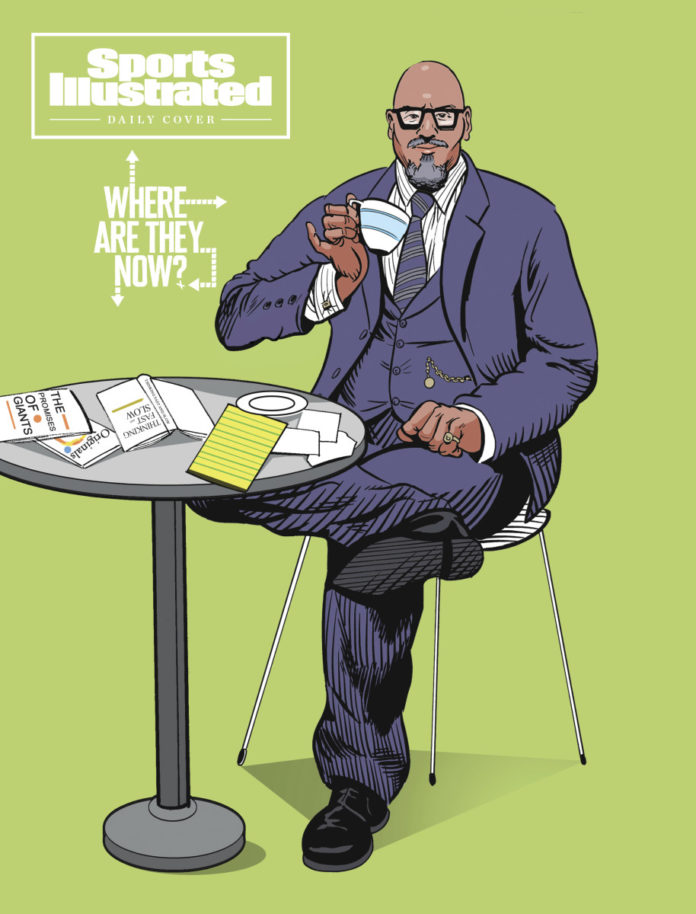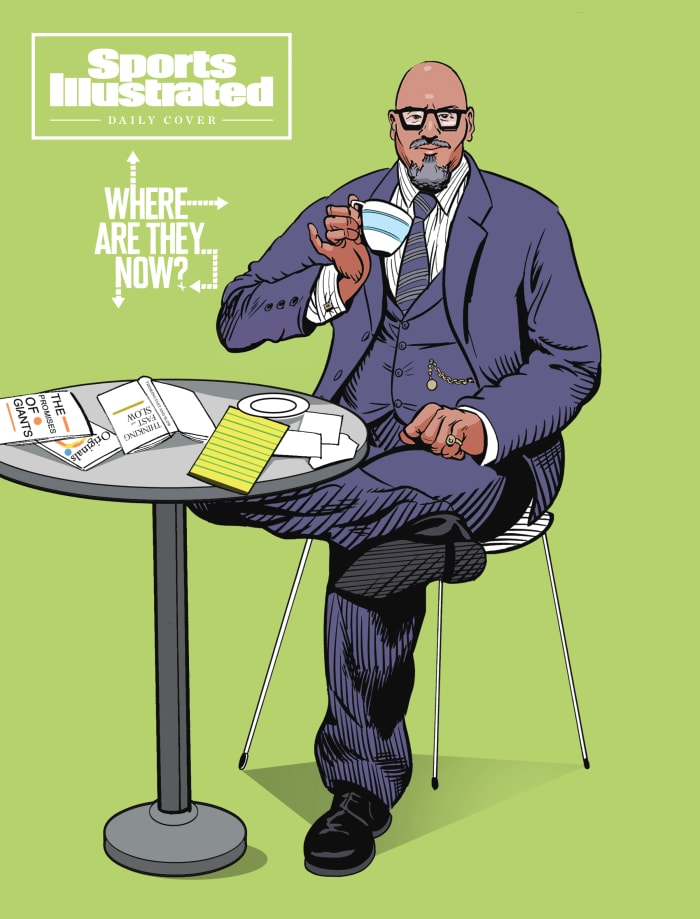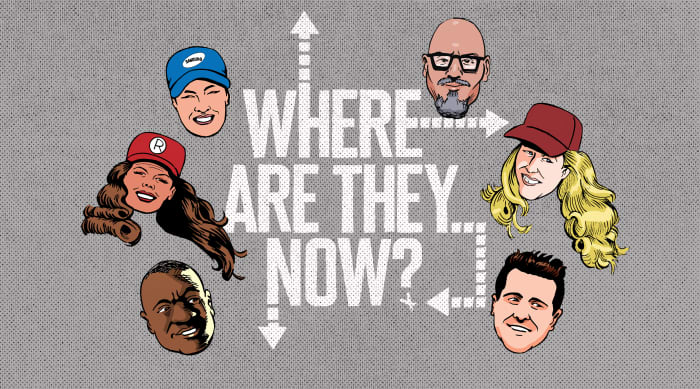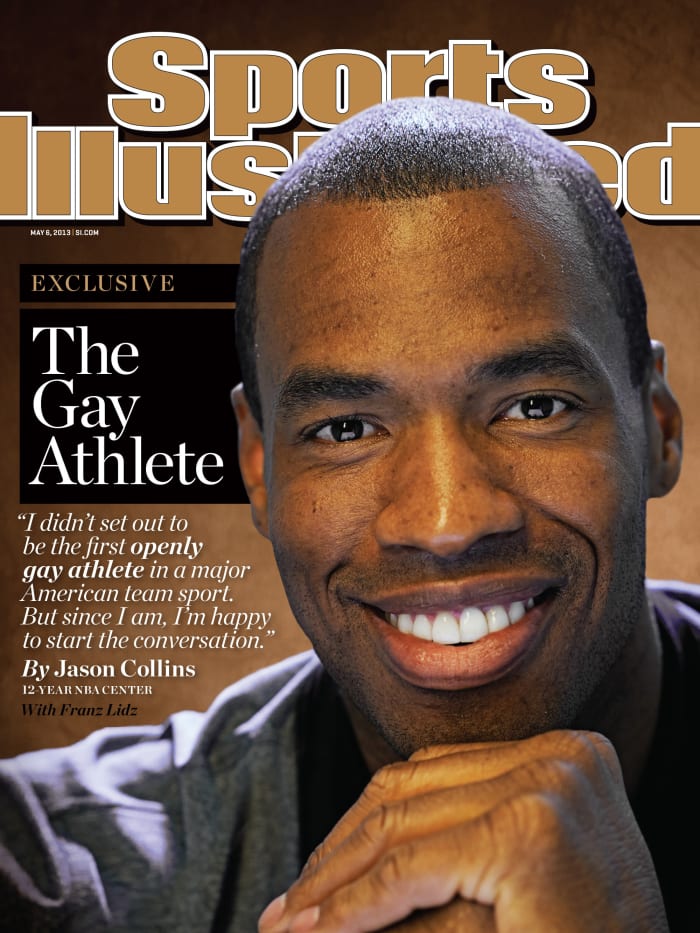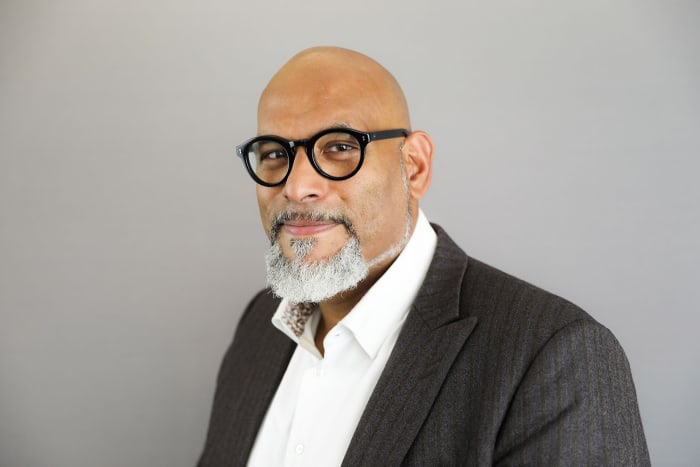Each summer Sports Illustrated revisits, remembers and rethinks some of the biggest names and most important stories of our sporting past. Come back all week for more Where Are They Now? stories.
In relating how he got where he is today, John Amaechi likes to tell a story.
The year was 1999 and Amaechi, then a center for the Magic, was considered by teammates—and much of the league—to be something of an odd duck. One of the first British NBA players, he drank tea, eschewed partying and read psychology textbooks on the team plane, studying toward a degree, while others played cards.
One evening, as he was sitting at a four-top table on the team flight, eating catered PF Chang’s and typing away on a primitive laptop, a teammate sat down with him.
Amaechi closed his computer, surprised. “Hey,” he said.
The teammate looked at Amaechi, then declared, “My girlfriend doesn’t like my wife very much.”
That was it. No preamble. So Amaechi did his best to help. “I shudder to think what I told him,” says Amaechi. “Because I know I was s— [as a therapist] back then. Knowing the right thing to say and the thing to shut up about, how much to let the pauses breathe—it’s something you pick up over time. You don’t really get it at first because you think therapy is advice. It’s not that. It’s asking people questions. Noticing things.”
Amaechi kept at it, though, and by the time he retired from the NBA, in 2003, after five seasons split between the Cavs, the Magic and the Jazz, he was on his way to receiving his doctorate and embarking upon a second career far from the court, as he’d always planned.
On his way out the door, Amaechi decided to stir the pot a bit.
The news broke Feb. 7, 2007. “In a groundbreaking revelation that began to reverberate around the NBA,” wrote ABC News, “Amaechi has become the first professional basketball player to openly identify himself as gay.”
Perhaps you recall the general reaction. Amaechi’s disclosure, in his book Man in the Middle, led to a celebration in the LGBTQ community. “It’s hugely important for the kids, so they don’t feel alone in the world,” said Martina Navratilova, the most prominent openly gay athlete at the time. “We’re role models. We’re adults, and we know we’re not alone—but kids don’t know that.”
“What John did is amazing,” said Esera Tuaolo, who’d come out in 2002, three years after his own career as an NFL defensive tackle ended. “He does not know how many lives he’s saved by speaking the truth.”
Others responded with less enthusiasm. “As long as you don’t bring your gayness on me, I’m fine,” said the 76ers’ Shavlik Randolph. LeBron James, in his fourth season with the Cavaliers, talked about trust: “With teammates you have to be trustworthy, and if you’re gay and you’re not admitting that you are, then you are not trustworthy.” But the most jarring response came from Tim Hardaway, a five-time All-Star who was four years out of the league at the time. “I hate gay people, so I let it be known,” Hardaway said on The Dan Le Batard Show. “I wouldn’t want him on my team. … If he was on my team, I would, you know, really distance myself from him because, uh, I don’t think that’s right. … I don’t think he should be in the locker room while we’re in the locker room.”
Read More Where Are They Now? Stories
A furor ensued, one that would trail Hardaway—and, to a certain extent, Amaechi—for years. And then the world moved on. For most American sports fans, Amaechi’s announcement likely remains the last thing they remember about him. Big British guy. Drank a lot of tea. First NBA player to come out.
And plenty of people might be pleased with this legacy. It’s not the worst thing to be known as a pro athlete and a trailblazer, after all. Brands have been built on less.
But Amaechi is not like most people, and certainly not like most NBA players. A story like his requires telling two separate but intertwined tales: the story of John Amaechi, and the story of what John Amaechi represents.
Let’s start with Amaechi.
On a recent spring morning he buzzes me up to his top-floor flat in the Covent Garden neighborhood of London, not far from the theater district and the Royal Opera House. On this morning, as with many, he’s been up since 3:45, when he brewed enough tea to fill three thermoses, from which he sips throughout the day.
Now 51, his head is shaved and his finely trimmed beard traces his jawline before culminating in a magnificent white goatee, which, when paired with round, dark-framed glasses, give the impression of an exceptionally large guru or professor. Which he is, basically.
After retiring from the NBA, Amaechi did get that degree. He put in the thousands of hours of required training, studied family therapy, got his MFT, and then specialized in organizational psychology, earning accreditation from the British Psychological Society. He picked up a host of other titles, including becoming a fellow of the Royal Society for Public Health, founded a psychology-based consulting firm, now known as APS Intelligence, and began working with businesses across Europe, focusing on teamwork, leadership, efficiency, diversity and inclusion.
In his living room you’ll find various research commendations, along with a photo of him with Barack Obama, a tome on cognitive psychology and a mug that reads OF COURSE I TALK TO MYSELF (SOMETIMES I NEED EXPERT ANALYSIS). Even his knick-knacks—of which a fair share are Star Wars-themed—help tell his story. Ask Amaechi about the Encanto figurines on his bookshelf and he gushes: “I mean, there’s a cartoon about intergenerational trauma and its impacts on people’s behavior, which I think is fascinating.”
Only with some searching, however, can you find any reminders of his first career. There, wedged into the bottom of the bookshelf, a single volume: The NBA Encyclopedia, in which Amaechi appears near the start, between Aluma, Peter and Amaya, Ashraf. His online presence is similarly spare; you have to scroll through 18 experiences on his LinkedIn page (where he lists himself as an “everyday Jedi”) before, at the bottom, you find mention of any affiliation with the NBA, where his experience is described simply: Player.
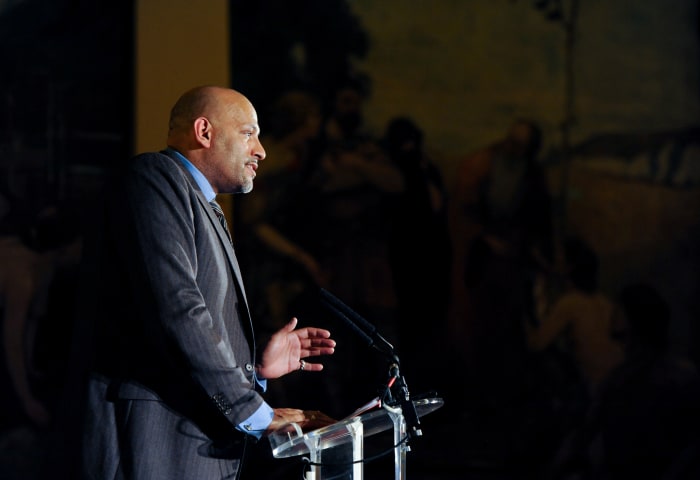
Amaechi addressed the British contingent at the 2014 Paralympic Games in Glasgow.
Mark Runnacles/Getty Images
Amaechi has a few reasons for downplaying his career—and for wearing his lengthy CV like “a sandwich board,” as he puts it. The first is practical. “The stereotypes around athletes are not conducive to people [taking me seriously]. … It takes a remarkably long time to convince the general population that a large black person is clever,” he says. “So, it’s a non-useful piece of background knowledge … which doesn’t mean anything to most people here anyway.”
Here is Europe, where Amaechi is a sought-after speaker and something of a thought leader. A lot of what people get when they bring on his company, from what I can tell, is a heavy dose of John. Additionally, he hosts podcasts and virtual Q&As. Not long ago, he interviewed the popular science author Adam Grant for APS. Soon, he’ll interview the director JJ Abrams. He writes for The Guardian and weighs in on social and cultural issues for CNN and The Dan Le Batard Show. When the BBC needed someone to explain the concept of white privilege for a series of videos geared toward school children, producers called on Amaechi. “White privilege doesn’t mean you haven’t worked hard or you don’t deserve the success you’ve had,” Amaechi said. “It doesn’t mean that your life isn’t hard or that you’ve never suffered. It simply means that your skin color has not been the cause of your hardship or suffering.” Those videos went viral, racking up more than four million views. (As with viral things, some loved them, and some hated them.)
On the morning I visit, he is presenting a virtual keynote with a French company in the advertising and PR sector. By 7:45 he has settled into his home office on the lower floor of the flat. In part because of the pandemic, and in part because Amaechi is an introvert—he likes people but finds them “energy-expensive”—he does nearly all his work here, in a converted bedroom outfitted with a green screen, a bank of lights and two webcams.
During his NBA days Amaechi made the All-Interview team, and to spend any amount of time with him is to understand why. He is funny, he can speak in paragraphs and he has a disarming habit of pausing just longer than expected. He presents as self-deprecating but authoritative, peppering his speech with psychological terms such as “introjected regulation,” which he then waves away, so as not to sound stuffy, saying, essentially, You don’t need to remember this, but know that it’s a thing.
Splashed across Amaechi’s T-shirt this morning: ACCOUNTABILITY IS SEXY. Personal responsibility is a recurring theme, both in his speeches and in his recent book, The Promises of Giants, which argues that leaders need to be aware of their impact at all times and that transparency, empathy and accountability are paramount. “Tough, objective, regular feedback is one of the ways we show we care,” he tells the execs at the French company.
Over the course of the day, I observe Amaechi presenting, taking calls and leading a pair of one-on-one executive coaching sessions. While he says that APS is financially successful, with offices in Manchester and London, and 20 employees, he hopes that his work with Fortune 100 firms will one day subsidize a turn toward coaching a new generation of leaders that is “more broad and diverse.” He compares this tradeoff to an actor who shoots a Marvel movie so he can also do an indie project.
I listen in on one of these indies, a free coaching session with a young, successful exec at a nonprofit. Midway through the conversation, Amaechi reframes what this woman has said to pinpoint what she feels is missing in her life.
Quietly, she begins crying. He asks why.
“No one has ever explained me like that before,” she says.
It’s O.K. to feel like this, Amaechi tells her. “Some of the most successful people are profoundly sad.”
Amaechi grew up in Stockport, not far from Manchester, the child of a white British doctor and a Nigerian businessman. (John’s given name is Uzoma Ekwugha Amaechi.) The rare dark-skinned boy in a white community, he felt like an outsider from an early age. Introverted, “fat and nerdy,” he towered over his classmates, whom he recalls gawking at him and calling him “the Whale.” He saw in their faces disdain, suspicion, pity. And so he retreated to his room to read science fiction books and eat sweets.
When as a schoolboy he read The Hunchback of Notre Dame, he did so in a day, feeling seen in a way he never had before—the story mirrored how he felt treated by others. Years later he would learn a term in psychology, coined in 1902 by the American sociologist Charles Cooley: the looking-glass self. In essence, we each develop our identity based on the perceptions of others.
Then, when Amaechi was 17, a man stopped him on the street and said he looked like he could be great at basketball. Not good, great. John gave it a try. He missed the backboard on his first shot. Even so, on the court he felt special. Other boys vied to pick him for their team. By high school he was writing in his yearbook that his ambition was “to play on a NBA championship team in the States and earn a lot of money.” Never mind that only three British players had made the league in the previous 40 years, or that John had no connections in the U.S. He wrote letters to dozens of American high schools, asking if they had any use for a 6′ 9″ British basketball player with good grades. Eventually, he found a home at a Jesuit high school in Toledo.
To pursue his dream John had to leave behind his mother, Wendy, the guiding light in his life, who had cancer. A British medic, Wendy had followed John’s father, who used the anglicized Jon, to Nigeria, providing medical care in the field as Jon fought in the three-year Biafran civil war. When it became apparent that Jon’s ethnic group, the Igbo, would lose the war, the couple fled on foot, eating grubs and berries to survive.
The union did not last. Jon became, as John puts it, a “malign” presence, and Wendy fled with John and his two sisters. As on that trek out of Nigeria, she entered survival mode, working long hours to support the family. John remembers how she’d often be gone when he awoke and wouldn’t return until after he’d put himself to bed.
It was Wendy who helped John with what he termed “the plan,” his unlikely strategy to make the NBA. From Toledo he earned a scholarship to Vanderbilt, where he rode the bench, then transferred to Penn State, where he became an Academic All-American and the school’s all-time leader, at the time, in blocked shots. During his junior year, Wendy passed away at the age of 51.
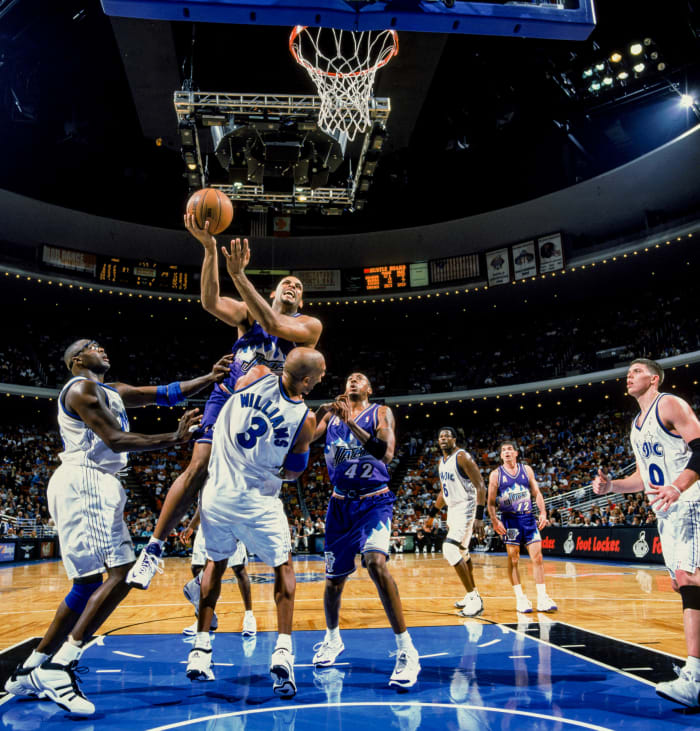
Amaechi’s stat line over two years in Utah: 2.8 points and 1.6 rebounds per game.
Fernando Medina /NBAE/Getty Images
After graduation he realized his dream, becoming the first undrafted free agent to start in his first NBA game, at center for the Cavs. By Amaechi’s count, only two other players had pulled off anything resembling his seven-year ascent from nothing: Hakeem Olajuwon and Tim Duncan.
Of course, Amaechi is quick to note that he is a “shadow” of those two Hall of Famers. But still: He made it. At least momentarily. He flamed out in Cleveland and spent the next three years toiling in Greece, Italy and France before latching on with Orlando, where a rookie coach named Doc Rivers took a chance on him. In the end, Amaechi played five NBA seasons, for three teams, averaging 6.2 points and 2.6 rebounds and providing endless color for beat writers, who delighted in his quirks and fondness for Earl Grey. (“For the NBA’s lone Englishman,” Franz Lidz wrote for Sports Illustrated, “basketball is not his cup of tea.”)
Americans mostly found Amaechi peculiar, never more so than in 2000, when, after his best season with the Magic, Jerry West and the Lakers flew him out to Los Angeles and offered up a six-year, $17 million contract. As Amaechi recalls, West took him to a fancy restaurant and said, “We’re prepared to sign you right now.” Amaechi would play for the legendary Phil Jackson and back up Shaquille O’Neal. “It was like being presented with everything you’ve ever wanted,” he says, “and in the presence of these basketball gods.”
And yet, Amaechi turned it all down, re-signing instead with the Magic for $600,000 one year. One can only imagine the ensuing trolling had NBA Twitter existed back then. As it was, Lakers fans flooded Amaechi’s inbox with emails informing him of his profound idiocy. But Amaechi felt tied to the Magic, who’d given him a second chance. As he later explained: “When people ask me [what my word is worth], I can say, at least $17 million.” (He ended up making $9.5 million across his career, per Basketball Reference.)
Amaechi loved that overachieving Magic team, a band of misfits and underdogs—hustlers like Darrell Armstrong and Bo Outlaw—led by Rivers, one of the league’s only Black coaches and perhaps its most open-minded at the time. Says Amaechi: “He was one of the few coaches that did not feel threatened by the fact that basketball wasn’t my whole being.”
For his part, Rivers took to Amaechi. “He was very smart,” the coach says. He also noticed that Amaechi was different in a lot of ways, but one way in particular. “It wasn’t known on the team [that he was gay],” he says. “But I would say it was suspected, if you know what I’m saying.”
At one point, teammates gathered at the front of Orlando’s plane, then chose a suitable emissary to send back, a veteran forward named Monty Williams. Amaechi recalls the exchange:
“Meech,” Williams said. “You don’t talk much about women.”
“Indeed,” said Amaechi.
“Cool, just checking,” Williams said.
And that was that. No doubt, Williams, a devout Christian, had his own beliefs about homosexuality, but Amaechi didn’t sense any ill will. Asked now if this surprised him at all, Amaechi pauses. “I suppose I’ve never made the assumption that being religious makes you an a–hole—or has to, necessarily. … My sense is that most people who are devoutly religious in the way that Jesus was, or Islam intended, would probably be rather pleasant to get along with. So, I don’t necessarily assume that people would have hang-ups, because I’m not asking other people to be gay. It’s not going to seep out of my pores into other people. You do you. I am not going to church on a Sunday; I’m not going to pray to a God I can’t see. And you don’t have to kiss blokes. It never felt that complicated.”
Amaechi made a handful of friends during those NBA days, including Tariq Abdul-Wahad, Andrei Kirilenko and Greg Ostertag, the 7′ 2″ center for Utah, where Amaechi played his final two seasons. Ostertag and Amaechi would hang out on road trips, playing video games together, and Ostertag, who grew up in Dallas, has fond memories of those days. “How is my guy John?” he asks. He remembers Amaechi as “funny,” “opinionated” and “super intelligent, a little above my grade.”
Ostertag now works as a real estate agent in Paris, Texas, a town of 24,000, about as red as red-state gets, where he sells mainly farmland—“but I’ll sell about anything,” he says. Ostertag has no problem with his old friend’s sexuality. “I couldn’t care less,” he says. “I’m happy for John. Good for John.” Ostertag likes to think this would have been his response back in the early 2000s, had Amaechi come out when he was a teammate. “I hope I would have accepted him and treated him no different,” Ostertag says. “John would have known that he is [gay], and I’m not, and I think in private I would have treated him no different.” He pauses. “But that was 20 years ago. I don’t want to say anything to get in trouble, but I’m trying to be honest here. When you’re young you think being gay is wrong.”
The first team-sport athlete to come out publicly, David Kopay, did so in 1975, three years after the end of his career as an NFL running back.
In 1982, Glenn Burke, a retired third baseman for the Dodgers, became the first baseball player to come out, in a story for Inside Sports. Burke had made no secret of his sexuality; according to his autobiography, Out at Home, the Dodgers even offered to pay him if he’d participate in a fake marriage.
In the decades after, other men’s team-sport athletes followed. In 1990, Justin Fashanu became the first professional soccer player to come out, in Britain. (Eight years later, he killed himself, at age 36.) Ian Roberts, an Australian rugby star, came out in ’94. Eventually, by the turn of the century, the NBA remained one of the only two holdouts among major American men’s team sports, along with the NHL. Then Amaechi broke that barrier. Six years later, in 2013, Jason Collins became the second NBA player, and the first active one, to come out.
Real Jason Collins’s 2013 Sports Illustrated Cover Story
And with that, the floodgates opened. As the culture shifted, and as the courts legalized same-sex marriage, and as out athletes became commonplace, the most progressive major men’s sports league in the U.S. led the way.
Just kidding. That’s what you might have expected. Instead, in 2022, Collins and Amaechi remain the only two NBA players to have come out publicly. Which leads to the obvious question: Why?
“Never underestimate people’s power to be a dick.”
Amaechi and I are discussing this conundrum on the way from lunch to his apartment, and as we walk people glance at him. He once made a short film in which he wore body cameras that captured people’s reactions to him. He’d walk by and, once he passed, they tended to point or gesture to a friend or take a picture.
Partly for this reason, he orders in most everything, including groceries and meals. Earlier this morning an energetic young man named Chris came by to outfit Amaechi with new shirts, tailored to his enormous frame.
“Nobody ever looks up,” he later says from his wrap-around patio, from which he can observe London without being observed. Here he watches the world: the ice cream shop on the corner, the bar where the businessmen get hammered at lunch, the top-floor restaurant where, on nice days, all the diners fight for the six outdoor tables.
But he digresses, as he does frequently. Amaechi says he has no beef with Tim Hardaway, who subsequently apologized publicly for his anti-gay statement, though Amaechi says Hardaway never reached out personally. For years, Hardaway told people his comments had kept him out of the Hall of Fame. When finally he was selected, this past spring, Amaechi received emails, he says, “from people telling me, ‘You see, despite all your efforts, Tim is going to get into the Hall of Fame.’” At which Amaechi laughs. “It wasn’t my efforts. I didn’t do anything!”
As for LeBron’s comments about how trust with teammates relates to openness about sexuality, Amaechi calls that idea “an incredibly dense piece of logic.”
“We are all responsible for being the type of person that other people are willing to share with,” he says. “It is absolutely true that if an LGBTQ person comes out to you, it’s a statement about you, unless [that revelation] has been forced. It’s: I think you deserve to know, and I think you will treat it with care and discretion. If you’re the kind of person this hasn’t happened to, then you are the kind of person who hasn’t behaved consistently enough in the right way.” (Though James never apologized for the “trust” comment, he supported Collins when he came out six years later, saying: “I think it’s very cool, man. None of us should go around wondering about what other people [think] we should be as human beings. I think it’s very strong of him.”)
When Amaechi came out publicly, he did so after seeing the British actor Ian McKellen in a Gay Pride parade. “You see some kid rise, like they are being filled with a kind of glorious helium, just by the wave of a stranger,” he remembers thinking. “And the truth is: In the LGBTQ community, not many of the people who are vaunted look like me. It’s good to have leaders who stand up and be role models, so that [other] people realize you can be weird, chaotic.”
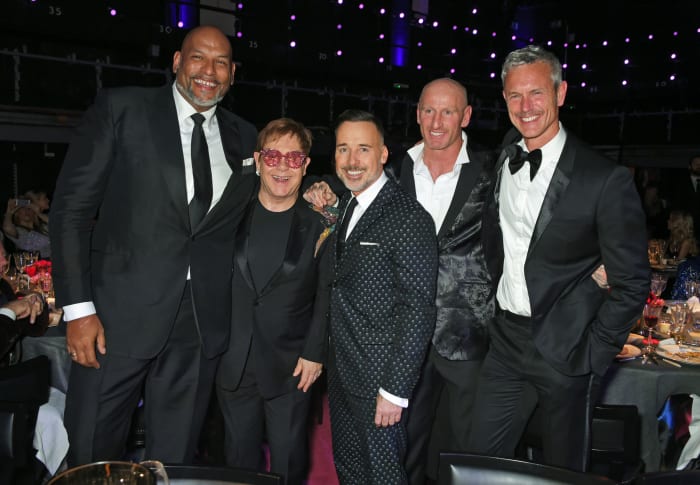
Amaechi, in 2017, joined Elton John (glasses) and gay rugby player Gareth Thomas (second from right) at an AIDS Foundation benefit in London.
Dave Benett/Getty Images for BVLGARI
This is a theme Amaechi returns to often. When you’re in the public eye, he believes, “you don’t have a choice in being a role model—the only choice is whether to be a good or bad one.”
Amaechi knew that some people would view him as a role model when he came out, just as he knew other people would diminish him. He just didn’t expect that his sexuality would become the only thing people knew about him. He had no idea that no one would mention his unprecedented path to the NBA. “Has anybody heard that story?” he asks. “No. Because I’m just a gay guy. Because identity trumps achievement.”
Which brings us back to the question: Why haven’t more NBA players come out? I asked this of a handful of other people in the sports world, including Hudson Taylor, the founder of Athlete Ally, a nonprofit dedicated to making athletic communities more inclusive. “There’s a risk-reward calculation that does not err on the side of the player coming out,” says Taylor, who every year, along with Jason Collins, talks to incoming NBA players. “The average career of an NBA player is three years, and many professional athletes are not set up to earn a significant livelihood outside of their sport.” That means: Many athletes have a very narrow window to earn the majority of the money they pull in across the rest of their life. “So, if that’s what’s at stake—if there’s any sense that coming out might reduce that [window] or lead to getting traded—any perception of risk is going to keep an athlete closeted.”
Doc Rivers blames the status quo. “It’s sports, and [being gay] is still looked upon as, in many ways, taboo,” he says. “It shouldn’t be.” He wonders if it will take a star player coming out to change things, but he, too, thinks money is an issue. “They don’t want that to hurt them in any way in signing a lucrative deal.”
As for Amaechi, though, he starts by challenging the core question. “If it’s just about being able to point to a gay person,” he says, “I’m not sure [that’s] a good sign of progress, really.
“There are lots of gay players in the league. They are well known to their teammates—at least some of them—and their friends. And some of their partners are also well known to family and friends in the family-and-friends room. If what we mean is that no journalist has permission to talk about [their sexuality], then that is true. But it’s a weird workplace, right? … [In the NBA] there are your colleagues—10 to 15 on your team—and then there’s an audience of 30,000 to 10 million people watching you.”
He looks at me. “It’s weird, right?”
“And people aren’t in the closet just because you don’t know [they’re gay]. People haven’t earned the right to know, that’s the truth. Fat bloke, front seat, 12C—you haven’t earned the right to know. You just yelled obscenities at me for missing a free throw. You don’t know me at all.”
True, I say, but no one counts the number of gay athletes in a sport like women’s soccer. Isn’t there a point where it becomes somewhat normalized, and isn’t that a good thing?
“Because people have already decided things that women do don’t matter as much as things that men do, even if that thing is the same thing,” Amaechi interjects. “That’s the truth, and we need to start saying that, because misrepresenting the status quo is part of how change fails. You can’t build change off a false platform. This idea that everybody values women equally to men, that’s bulls—.” (Among the many subjects Amaechi and I discuss over our various conversations, including Russia, gun violence and racial profiling, he gets particularly animated about the news, leaked a week before my visit, that the Supreme Court intends to overturn Roe vs. Wade.)
Amaechi continues. “We’ve just got to keep saying this to people: Women don’t matter as much as men. Black and brown people don’t matter as much as white people. People without disabilities matter more than people with disabilities. These are full-stop facts. We can’t make any progress until we say this is the truth.”
He becomes animated. The cool psychologist’s tone is gone.
“You want the gay people to come out? Change the a–holes around them, and not just the teammates, because they mostly don’t care—but equipment managers and weight coaches and administrators and team owners, who we all know are a progressive group, and the overarching organizations, one of which has just finished constructively dismissing an athlete for taking a knee. Yeah, that’s a safe place to come out.” He chuckles sarcastically. “It’s the weakest of organizations that say [the lack of out athletes] is about stupid jocks who would beat you up in the locker room.” (For what it’s worth: Rivers, now the coach of the 76ers, agrees that teammates wouldn’t be the issue, if they ever were. “It would be uncomfortable in the locker room for a very short time,” he says. “Very short, like a day or two. If the guy can play, they don’t care.”)
Amaechi leans forward now. “We’re focusing on the wrong people. You want gay people [to come] out? Make it so it’s not so s—-y. Make it so that someone can still look at you and see what you’ve achieved. Then maybe people will deserve that disclosure.”
This is a point Amaechi returns to repeatedly: Why is the burden so often placed on athletes to come out? “Disclosure is earned. It’s not about honesty. It’s personal and private information about me that people who give a s— about me deserve to know—and people who don’t, don’t. If you toss your beer at me through the tunnel as I walk away, do you deserve anything?”
To view it as Amaechi does is to flip the narrative. It’s valid to ask why, in the NBA culture, men might not feel comfortable coming out, but it is not, he says, the right question. Amaechi takes an example from his own life. “Even today, I don’t tell everybody I’m gay. Why should I have to? I went on a date the other day, and it suddenly struck me as I looked at this person: I’ve never held a partner’s hand in public. I’m 51 years old.”
Really? I ask.
“Never. I had [a few] people I dated for three and four and five years, never held their hand in public. And it’s not because I’m—well, I don’t like to be touched, that is true, but that’s not the reason. It’s that I just don’t want to deal with it. Because I will. Because I’m the guy, I’m going to deal with it. Did you have something to say? And then it’s not a date anymore, then it’s a f—ing activist thing.”
He is not pausing now. He is angry. “Maybe you can make it so that if you kiss your partner on the way out the office, or hold hands, nobody says anything—then we graduate from there, before we get to NBA players who are supposed to come out to be saviors.”
Amaechi’s phone buzzes. He’s late to a call with his APS team. “I have to take this,” he says and he hustles off, leaving me to ponder what he’s said, and what to do with it.
Where is John Amaechi now? The better question might be Who is John Amaechi now? Because the answer is certainly not “retired NBA player.” Rather, he’s a psychologist, executive, mentor, instigator and Star Wars fan. He’s either a truth teller or a liberal windbag, depending on who’s doing the labeling. He’s an introvert and a ponderer and a man who misses his mother every day.
And, in sports—men’s sports, anyway—he’s a symbol of a world that felt like it was changing but maybe hasn’t changed that much at all.
Read More ‘Where Are They Now?’ Stories:
• Pete Sampras Is Doing Just Fine
• Katie Hamilton Will Speak For Herself, Thank You
• There Is Still Chlorine In Michael Phelps’s Soul

